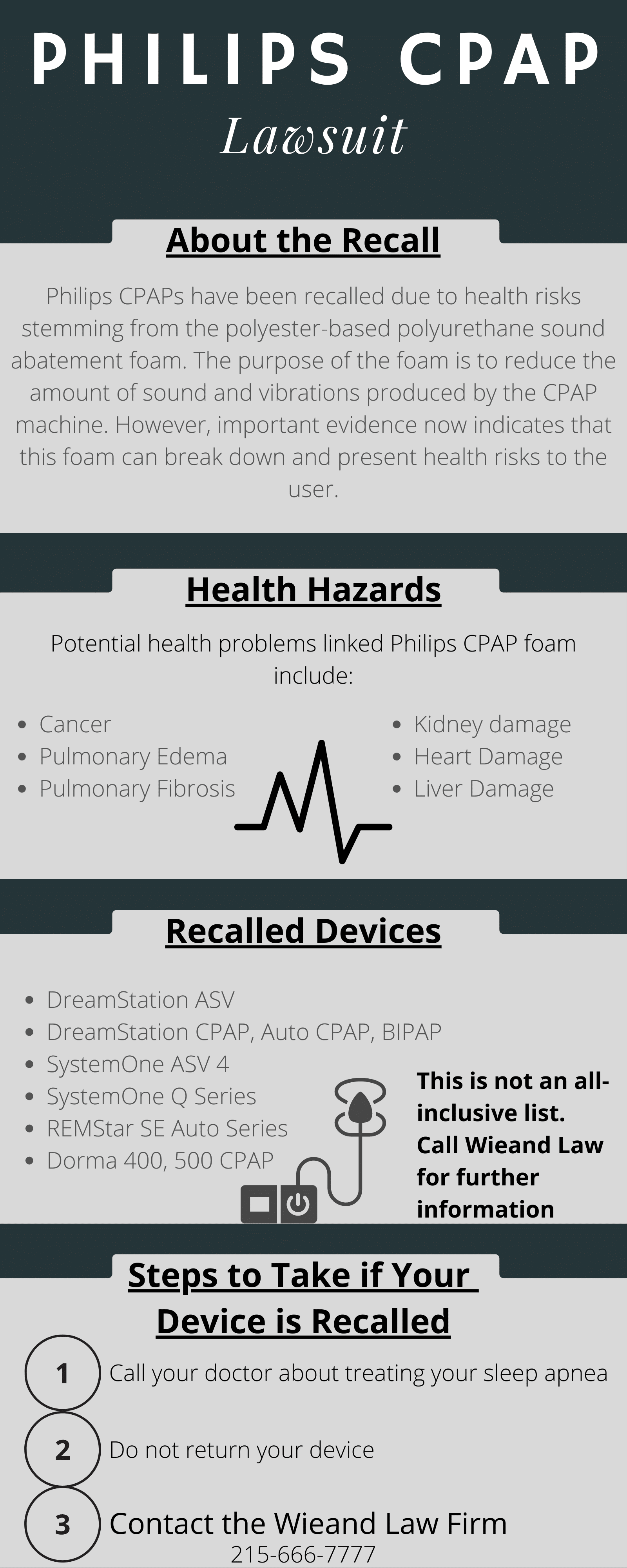A Philips CPAP lawyer may be able to help if you have used a Philips CPAP machine that was recalled. There are more than 15 million Philips CPAP users who are troubled by information about the dangers of degraded sound abetment foam in these devices. Users have reported health issues associated with foam degradation and off-gassing from their CPAP, including links to cancer, lung issues, and heart damage.
The Philips CPAP Recall
As of January 2022, the FDA has recalled seventeen Phillips devices. The list of devices recalled can be found here. If your device has been recalled, speak with your doctor immediately about safely treating your sleep apnea.
Philips CPAPs have been recalled due to health risks stemming from the polyester-based polyurethane sound abatement foam. The purpose of the foam is to reduce the amount of sound and vibrations produced by the CPAP machine. However, important evidence now indicates that this foam can present health risks to the user. These health risks can occur in two ways. First, the foam can break down into small particles that are then inhaled by the patient. Secondly, the foam can release toxic chemicals that are inhaled by the CPAP user. This is called off-gassing.
In both of these situations, the CPAP user unintendedly inhales material from the CPAP machine. The FDA warns that “these issues can result in serious injury, which can be life threatening, cause permanent impairment, and require medical intervention to prevent permanent damage.” It states that CPAP users may experience side effects from inhaling these materials, including irritation to the skin, eye, and respiratory tract, headache, asthma, and toxic or carcinogenic effects to organs, such as the kidneys and liver.
Philips has admitted that off-gassing emits dimethyl diazine and Phenol 2, 6-bis at levels that exceed safety thresholds. Additional concerns have also been raised about off-gassing the foam’s other chemicals, such as benzene, formaldehyde, and methylene chloride.
Health problems potentially linked to the foam include:
- Cancer
- Asthma
- Pulmonary Edema
- Pulmonary fibrosis
- Kidney damage
- Liver damage
- Heart damage
The FDA investigation proved that Philips employees knew about the potential for foam gradation since 2015 but failed to act. Philips Respironics now faces legal action over these recalled devices. These lawsuits claim that Philip’s inaction caused Philips CPAP users to spend years inhaling potentially carcinogenic and toxic materials.
Currently, these lawsuits are handled by multidistrict litigation. Each plaintiff can seek compensation for their injuries using a streamlined process for consolidated claims. The Eastern District of Pennsylvania has over 100 lawsuits currently in process.
The claims against Philips Respironics are complicated. The plaintiffs are suing a major medical device manufacturer for complex damages. These claims have the potential for significant compensation but demand an attorney familiar with mass torts. The personal injury attorneys at the Wieand Law Firm, LLC are investigating claims for CPAP users and their families.
Contact a Philips CPAP Lawyer at Wieand Law Firm, LLC
If your Philips CPAP device has been recalled, be sure to act expediently. First, talk with your doctor about treating your sleep apnea before you stop using a recalled Philips CPAP. Untreated sleep apnea is dangerous, and your doctor can help advise you on treatment options. Also make a medical appointment to be examined for potential injuries due to the exposure. Next, register your recalled unit for replacement at https://www.philipssrcupdate.expertinquiry.com/registration. Finally, reach out to an experienced personal injury attorney from the Wieand Law Firm about filing a claim. The Wieand Law Firm offers free consultations and can help you understand the legal process.


